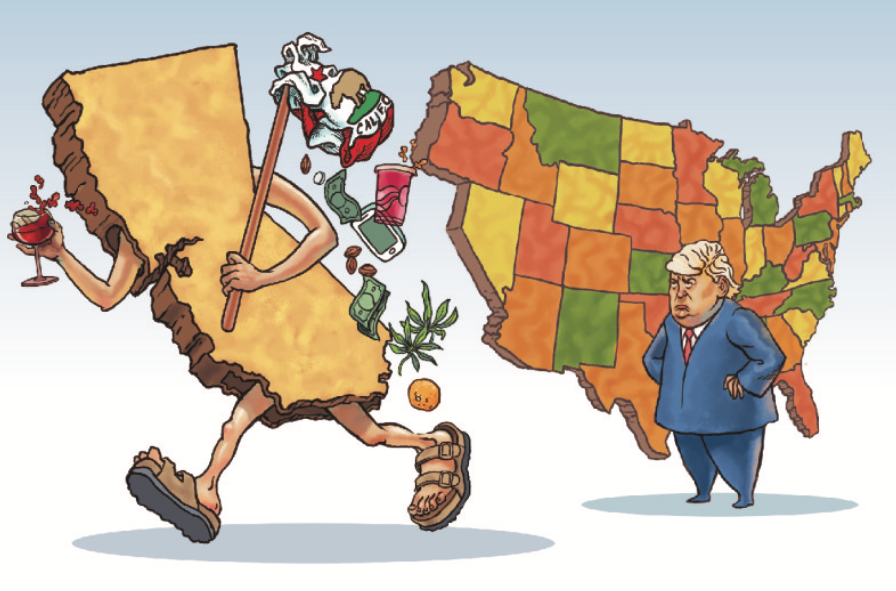CommentsPERSPECTIVE-The outcome of the presidential election was a surprise to me as much as it was to anyone. What is not a surprise is the reaction to it.
There have been some extreme events and outbursts, including rioting by some Clinton supporters and some nasty displays of neo-Nazism by the loosely organized Alt-right group. Fortunately, these reactions are not acceptable to the population as a whole. Most of us are moving forward and dealing with change in a rational manner. The checks and balances embedded in the Constitution will prevent significant, or even sudden, permanent changes to our government.
However, one proposed remedy to Trump’s victory resurrects an issue this nation has faced before…secession from the United States.
As a practical matter, according to an opinion piece in the Washington Post, it is virtually impossible, short of an apocalyptic disaster which throws our nation into dysfunctional chaos. Although there are many who believe we have been dysfunctional for a long time, I have news for you – the national government has not only survived, it has expanded its influence.
The Post article states: “Article IV, Section 3 of the Constitution specifies how a state can gain admission to the United States. There is no stipulation, though, for the reverse. Even if Obama wanted to let Texas go — a thought that probably appealed to him for at least a second — there’s no mechanism for him to do so. There’s no mechanism for Congress to simply say, ‘Sure, off you go.’ Once you’re in, you’re in. The United States was born an expansionist enterprise, and the idea of contraction, it seems, never really came up.”
To those proposing a Cal-exit, don’t waste your time, or those of the state’s voters, with a referendum to seek secession.
Having said that, the topic is worthy of an interesting hypothetical discussion.
Did the Civil War really resolve whether secession is constitutional? I touched on this subject in an article I wrote for Citywatch in connection with the Civil War Sesquicentennial.
As I pointed out, the seven states that seceded prior to Lincoln’s inauguration could have gotten away with it had Fort Sumter had not been fired upon by Confederate batteries. Absent the catalyst the attack provided, the nation had no stomach for war, much less a civil war. Had Lincoln raised troops to forcibly end secession, it is likely the entire Upper South would have joined the Lower South, including the critical border states of Kentucky and Maryland. Washington would have been isolated; Lincoln’s administration would have been dead on arrival.
A southern-leaning Supreme Court, led by Chief Justice Roger Taney, a slaveholder himself, may have ruled in favor of the break.
What the Civil War did make certain was the illegality of forceful secession.
Does that mean peaceful or passive secession is permissible?
As mentioned earlier, there is no process for separation via legislation. There is nothing in the Constitution to guide Congress; nothing even stipulating a voting margin for such an action. Any request by a state to secede would simply die.
But let’s just say it did occur.
Just like divorce, there would be a property settlement...and would that be costly to California! Do you think the rest of the states would transfer control of Yosemite and other national parks for a song? How about military installations and other federal government real estate?
The financial obligations California would incur for buying out its share of the unfunded liability of Social Security and Medicare of its citizens would be worse.
California claims to receive less monies from the federal government than it sends. That is so much BS. The benefits to the state from physical protection and security provided by the federal government is incalculable. In terms of economic trade, California’s primary trading partners are part of the Pacific Rim. Without the leverage of the federal government behind us, we would be at a disadvantage in negotiations with China and Japan, whose economies dwarf those of the Golden State.
Then there are details of establishing a monetary unit and a central bank.
How about supporting embassies throughout the world?
The nation of California would be bankrupt from the get-go.
One other thing. There are regions within California which will not go along with the plan. Much of California’s agriculture and water is attributable to the Central Valley and Sierra Nevada, respectively. Those regions would balk at the plan. They would form their own state, or possibly request to join Nevada. Sacramento would find itself isolated from the rest of its subjects. California would be totally dependent on a foreign government for food, water and energy.
The secession movement is laughable until you realize its proponents really believe it is plausible. For their sake, I sure hope they do not receive Nigerian e-mail solicitations.
But just the talk of secession further alienates California from the rest of the nation.
One of our top attractions is Wine Country. We do not want to be labeled Whine Country.
(Paul Hatfield is a CPA and serves as President of the Valley Village Homeowners Association. He blogs at Village to Village and contributes to CityWatch. The views presented are those of Mr. Hatfield and his alone and do not represent the opinions of Valley Village Homeowners Association or CityWatch. He can be reached at: [email protected].) Graphic: Jeff Durham/Bay Area News Group. Prepped for CityWatch by Linda Abrams.
Explore
Our mission is to promote and facilitate civic engagement and neighborhood empowerment, and to hold area government and its politicians accountable.

 CityWatch Los Angeles
Politics. Perspective. Participation.
CityWatch Los Angeles
Politics. Perspective. Participation.
24
Thu, Apr















